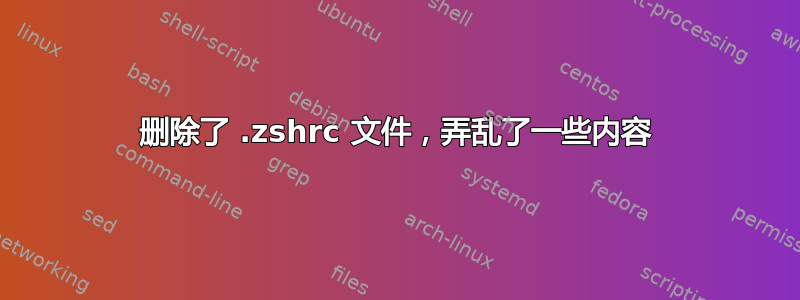
Oh-My-Zsh 运行良好。我正在编辑.zshrc文件,但有些东西搞砸了。以下这帖子我尝试重置我的 zsh。我删除了与 zsh 相关的所有内容。
跑:
sudo apt-get purge zsh和sudo apt-get autoremove zsh
尝试从中删除它/usr/bin,/etc/shells然后尝试用重新安装 zsh,apt-get但.zshrc没有恢复。我知道我在这里很愚蠢,但我不知道如何修复它。请帮忙。我已经安装了 Oh-My-Zsh,但后来我弄乱了 ZSH Shell。
答案1
因此,我从另一个帖子中找到了一个很好的解决方案,.bash_profile它也适用于此处。如果您的终端窗口仍打开,并使用之前的配置:
要恢复定义的变量和函数:
$ declare > ~/.zshrc.recovered
并取回别名
$ alias >> ~/.zshrc.recovered
答案2
答案3
我很确定它在你安装 oh-my-zsh 时就已经安装了。无论如何,这是我自己的 oh-my-zsh 设置中的一个基本示例:
# Path to your oh-my-zsh installation.
export ZSH=~/.oh-my-zsh
export TERM="xterm-256color"
# Set name of the theme to load.
# Look in ~/.oh-my-zsh/themes/
# Optionally, if you set this to "random", it'll load a random theme each
# time that oh-my-zsh is loaded.
ZSH_THEME="powerlevel9k"
# Uncomment the following line to use case-sensitive completion.
CASE_SENSITIVE="false"
# Uncomment the following line to use hyphen-insensitive completion. Case
# sensitive completion must be off. _ and - will be interchangeable.
HYPHEN_INSENSITIVE="true"
# Uncomment the following line to disable bi-weekly auto-update checks.
# DISABLE_AUTO_UPDATE="true"
# Uncomment the following line to change how often to auto-update (in days).
# export UPDATE_ZSH_DAYS=13
# Uncomment the following line to disable colors in ls.
# DISABLE_LS_COLORS="true"
# Uncomment the following line to disable auto-setting terminal title.
# DISABLE_AUTO_TITLE="true"
# Uncomment the following line to enable command auto-correction.
ENABLE_CORRECTION="true"
# Uncomment the following line to display red dots whilst waiting for completion.
COMPLETION_WAITING_DOTS="true"
# Uncomment the following line if you want to disable marking untracked files
# under VCS as dirty. This makes repository status check for large repositories
# much, much faster.
# DISABLE_UNTRACKED_FILES_DIRTY="true"
# Uncomment the following line if you want to change the command execution time
# stamp shown in the history command output.
# The optional three formats: "mm/dd/yyyy"|"dd.mm.yyyy"|"yyyy-mm-dd"
# HIST_STAMPS="mm/dd/yyyy"
# Would you like to use another custom folder than $ZSH/custom?
# ZSH_CUSTOM=/path/to/new-custom-folder
# Which plugins would you like to load? (plugins can be found in ~/.oh-my-zsh/plugins/*)
# Custom plugins may be added to ~/.oh-my-zsh/custom/plugins/
# Example format: plugins=(rails git textmate ruby lighthouse)
# Add wisely, as too many plugins slow down shell startup.
plugins=(git)
# User configuration
export PATH="/usr/local/bin:/usr/bin:/bin:/usr/local/games:/usr/games:/usr/local/sbin:/usr/sbin:/sbin"
# export MANPATH="/usr/local/man:$MANPATH"
source $ZSH/oh-my-zsh.sh
# You may need to manually set your language environment
# export LANG=en_US.UTF-8
# Preferred editor for local and remote sessions
# if [[ -n $SSH_CONNECTION ]]; then
# export EDITOR='vim'
# else
# export EDITOR='mvim'
# fi
# Compilation flags
# export ARCHFLAGS="-arch x86_64"
# ssh
# export SSH_KEY_PATH="~/.ssh/dsa_id"
# Set personal aliases, overriding those provided by oh-my-zsh libs,
# plugins, and themes. Aliases can be placed here, though oh-my-zsh
# users are encouraged to define aliases within the ZSH_CUSTOM folder.
# For a full list of active aliases, run `alias`.
#
# Example aliases
# alias zshconfig="mate ~/.zshrc"
# alias ohmyzsh="mate ~/.oh-my-zsh"


